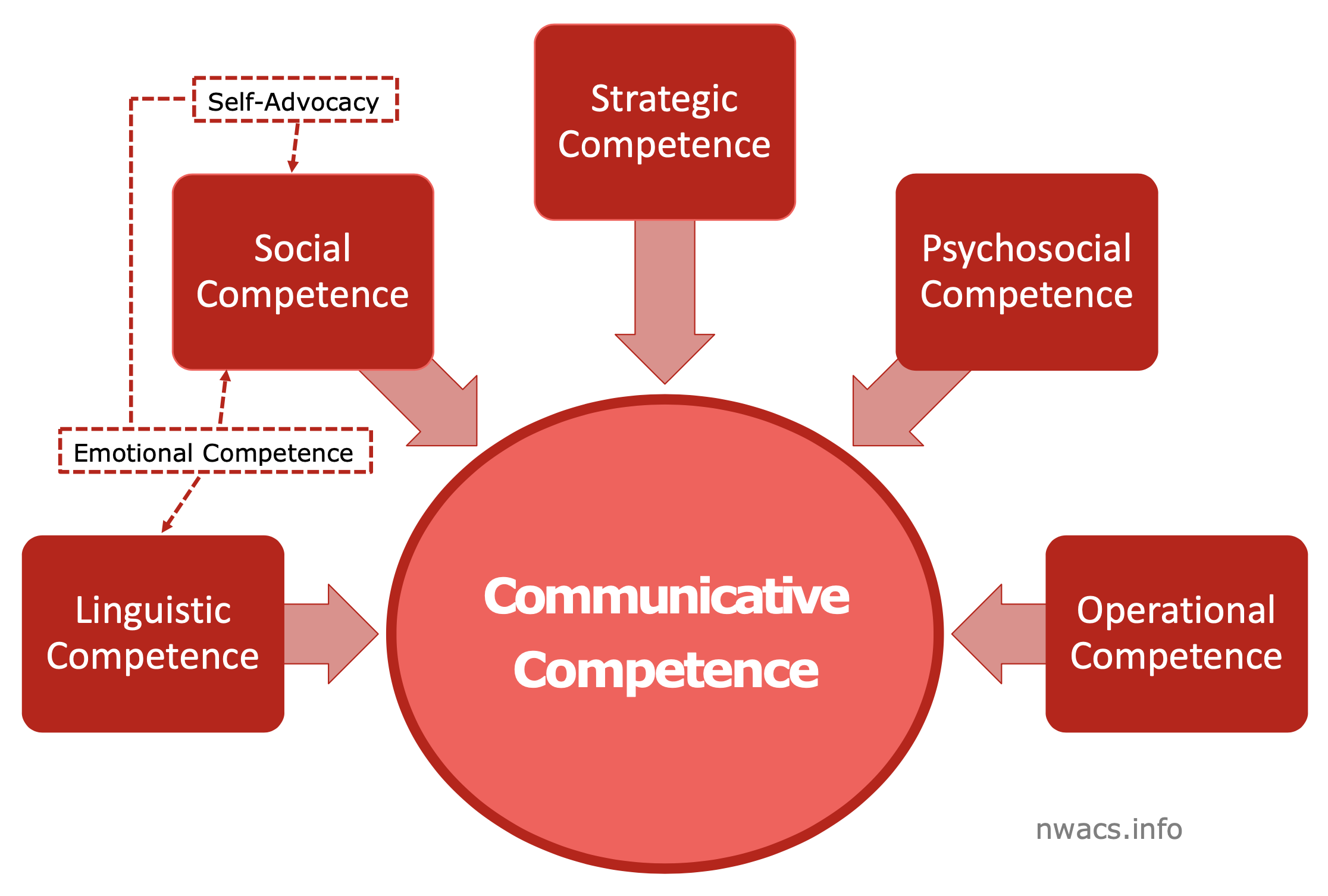Communicative competence is an individual’s ability to freely express ideas, thoughts, and feelings to a variety of listeners across contexts. It provides the means to achieve personal, educational, vocational, and social goals (Calculator, 2009; Light & McNaughton, 2014; Lund & Light, 2007). Individuals must achieve communicative competence whether they use natural speech or AAC, but their paths may vary (Light et al., 2003).
- The American Speech-Language-Hearing Association (ASHA) ; retrieved 7/31/21 from Augmentative and Alternative Communication (Practice Portal)
Communicative Competence is a group of skills that let a person communicate about anything to anyone. In 1989, Dr. Janice Light described communicative competence for people who use augmentative/alternative communication (AAC). She said that people using AAC had to learn and combine knowledge, judgment, and skills in four connected areas:
linguistic,
operational,
social,
and strategic.
She later (2003) added the area of psychosocial to her description. She also noted that barriers and supports around the person were a factor. A lot has changed since Light first described communicative competence in AAC, yet it is still a relevant and useful framework.
In 2009, Dr. Sarah Blackstone and Dr. David Wilkins looked at how emotional competence impacts the communication abilities of children with complex communication needs. They found that emotional competence relates to pragmatics, social communication, and self-talk. They advocated for the need to address this skill area. Emotional competence is part of the linguistic and social areas, but is important as its own area.
In 2014, Kate Ahern, M.Ed. suggested a “bonus” competency for AAC communicators: self-advocacy. Self-advocacy fits in the social area. But it is so important for people with complex communication needs that it is worth focusing on as its own area.
skills contributing to communicative competence
“Communicative competence is essential to the enhancement of the quality of life of individuals with complex communication needs; it is fundamental to the attainment of the basic human need, the basic human right, the basic human power of communication.”
So, what does all this mean? A person must have skills in each of these areas:
linguistic,
operational,
social,
strategic,
psychosocial,
emotional,
and self-advocacy,
as well as a supportive environment.
We must teach skills in each of these areas to support the needs of AAC communicators. They need these skills to:
express ideas, thoughts, and feelings,
have social relationships,
and engage and take part in daily interactions.
Watch for more posts to explore each of these communicative competency areas further.
References:
Ahern, K. (2014, April 8). Meaningful and Evidence-Based Goals - Part One AAC. Teaching Learners with Multiple Special Needs. http://teachinglearnerswithmultipleneeds.blogspot.com/2014/04/meaningful-and-evidence-based-goals.html
American Speech-Language-Hearing Association (n.d.). Augmentative and Alternative Communication (Practice Portal). Retrieved July, 31, 2021, from www.asha.org/Practice-Portal/Professional-Issues/Augmentative-and-Alternative-Communication/.
Blackstone, Sarah & Wilkins, David. (2009). Exploring the Importance of Emotional Competence in Children With Complex Communication Needs. Perspectives on Augmentative and Alternative Communication. 18. 78-87. 10.1044/aac18.3.78.
Janice Light (1989) Toward a definition of communicative competence for individuals using augmentative and alternative communication systems, Augmentative and Alternative Communication, 5:2, 137-144, DOI: 10.1080/07434618912331275126
Janice Light & David McNaughton (2014) Communicative Competence for Individuals who require Augmentative and Alternative Communication: A New Definition for a New Era of Communication?, Augmentative and Alternative Communication, 30:1, 1-18, DOI: 10.3109/07434618.2014.885080
Light, J. (2003). Shattering the silence: Development of communicative competence by individuals who use AAC. In J.C. Light, D.R. Beukelman, & J. Reichle (Eds.), Communicative competence for individuals who use AAC: From research to effective practice (pp. 3–38). Baltimore, MD: Paul H. Brookes.
Light, J. C., Arnold, K. B., & Clark, E. A. (2003). Finding a place in the “social circle of life”. In J.C. Light, D.R. Beukelman, & J. Reichle (Eds.), Communicative competence for individuals who use AAC: From research to effective practice (pp. 361–397). Baltimore, MD: Paul H. Brookes.
Related posts:










